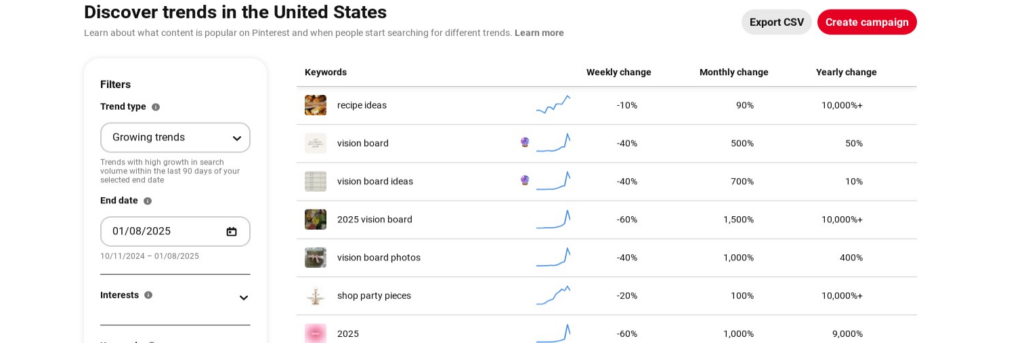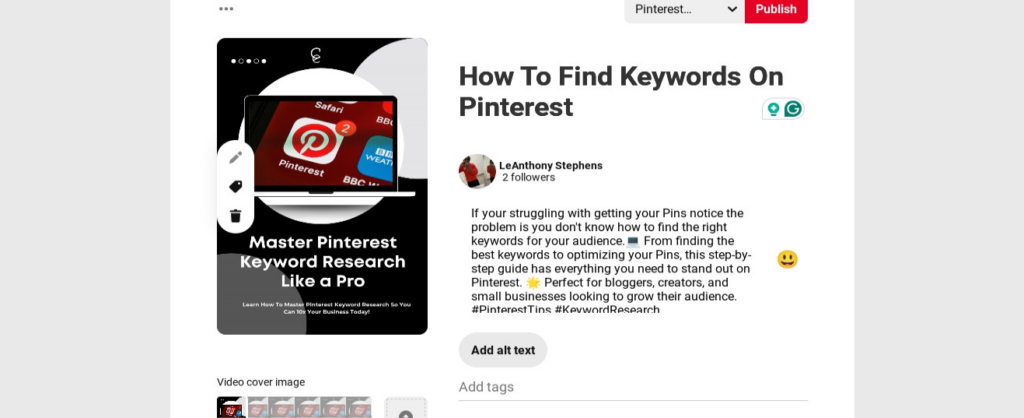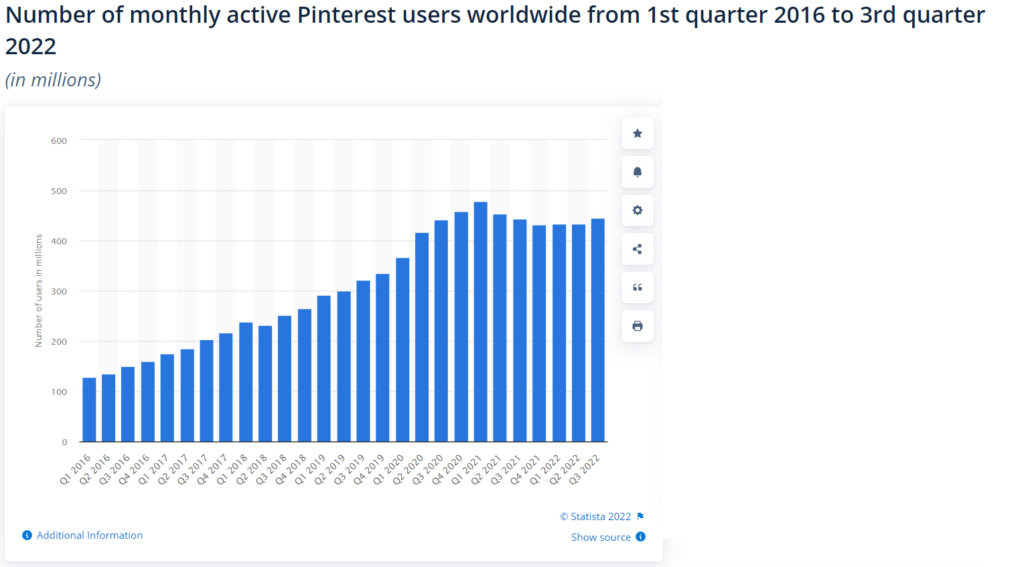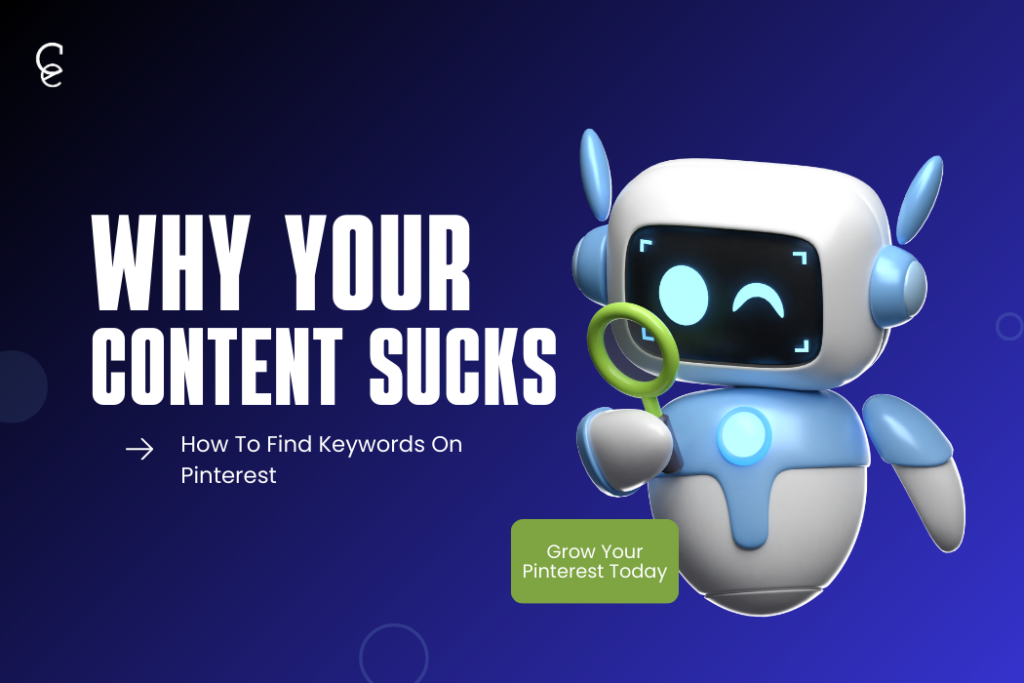If your content isn’t ranking, it’s probably because of your Pinterest keyword research strategy, or lack thereof. If you want to maximize your Pinterest platform, you must understand what keyword research is, why it’s important, and most importantly, when, where, and how to use it.
Let’s be real, we all want our pins to go viral, whether it’s to increase website traffic, boost conversions or just for simple popularity. Understanding keywords is the best way to improve your chances.
Pinterest isn’t just a social media platform. Pinterest is one of the world’s top search engines. Many users search on Pinterest the same way they search on Google.
This is why truly having Pinterest keyword research can help you rank higher, gain more followers, and get more monthly visits to your content and platform.
Ready to learn? Let’s dive in.
What Are Keywords?
Keywords are the words and phrases that people use to search for information, ideas, or solutions. So in the simplest terms, keywords are the words or phrases people type into search engines like Google or Pinterest to find content.
Incorporating keywords is extremely necessary because it is the only thing that connects your content to the right audience.
Think of keywords as the bridge between your ideas and your audience’s attention.
On Pinterest, keywords are even more important because the platform operates like a visual search engine. If you do not include the related keywords to your niche, your content will not reach its potential, slowing your rate of growth.
Why Does Pinterest Need Keywords?
Pinterest needs keywords to understand what you are talking about. Keywords are the foundation of all of Pinterest search systems.
This is why Pinterest is better than other social media platforms when it comes to long-term growth because the majority of social platforms rank based on likes, and popularity, like platforms such as Instagram, Twitter, and TikTok.
Keywords are going to help you categorize and rank your content so that your users can find exactly what they’re looking for. So, when someone searches for “designer hoodie ideas,” Pinterest is going to pull up pins that either include, or incorporate those keywords. ‘
With incorrect, or ineffective keyword usage, your content will get lost in the feed with others who have stronger keyword optimization. When you use keywords, you ensure your pins are discoverable, and that is going to help you grow your reach and influence on the platform.
How to Find Keywords on Pinterest (Step-By-Step)

In this guide, I will teach you how to create the perfect Pinterest keyword research strategy. We are going to go over how to find popular and demanding keywords, where to place them, and how to incorporate them naturally in your pin.
1. Visit The Pinterest Trend Page
Pinterest has a Trend Page , this page is just yet another must-use tool that Pinterest has to offer. It shows you the popularity of keywords over time, so you can identify temporary spikes, seasonal spikes, and long-term interest.
Example: Search for “designer hoodies” and you might notice a surge in September because it is back to school season.
Use this tool smartly as it can allow you to plan future pins and with a platform like Tailwind, you can set those to be planned out months in advance.
Pro Tip: Save these suggestions! They’re perfect for crafting blog titles, Pin descriptions, and naming your boards all of which will drive an increase in your Pinterest monthly visits.
2. Use the Pinterest Search Bar
The Pinterest search bar should be one of your first stops when searching for quality keywords. To utilize the Pinterest search bar, start by typing in a broad topic related to your niche, so for me, I would type in “Pinterest marketing”.
Pinterest will autofill suggestions based on what users are actively searching for. These keywords are the most popular and relevant right now and you should incorporate those into your strategy.
This specific Pinterest keyword research strategy can be used across other search engine-based platforms such as; Instagram, and TikTok.
For Example:
If you’re a lash tech looking to support beauty businesses on Pinterest type in “lash extensions”.
Pinterest will show you the perfect keywords to target to build your portfolio with multiple keywords that your audience is searching for.
Keyphrases like:
- Lash extensions for beginners
- Lash extensions aftercare tips
- Lash extensions for special occasions
These auto-suggestions show you exactly what people are searching for, so you can build your content surrounding their interests.
3. Look at Your Competition
Look and see what the successful people in your niche are doing and copy them.
Scan through their Pin descriptions, board titles, and hashtags and see what keywords are they targeting and ranking for, and how their ranking for them.
If you see recurring phrases in their content, it’s likely working for them.
4. Use Ahrefs
While Ahrefs isn’t a Pinterest-exclusive marketing tool, it is honestly my personal favorite marketing tool I have. Ahrefs helps you find low-competition, high-search-volume phrases that not only align with Google but with Pinterest users’ interests as well.
Combine these strategies every time you’re in need of new keywords to pin and you will never run out of quality content ideas.
1. The Best Place To Place Pinterest Keywords To Boost Optimization

At this point you’ve done the research, and you found your 10-20 targeted keywords. Now you have to find the perfect place to place them. Knowing where to strategically place your keywords is just as important as finding them, as incorrectly placing them can actually hurt your content.
Pin Titles
- When making your Pinterest Pin titles make sure to make them catchy, and also keyword-rich.
- Besides the pin itself the Pin title is the first thing users see, so be sure it grabs attention while including your primary keyword.
- Example: Instead of “Designer Shoes,” try “Designer Resellers for Under $100.”
- Pinterest titles with optimized keywords attract a greater audience because it is specific and more detailed.
Pin Descriptions
- Write natural Pinterest descriptions but make sure to include your primary and secondary keywords to double down and boost your optimization.
- As said before Pinterest loves optimized content because it tells the platform how to interact with this platform and where to send it
- Example: “Step up your style game with affordable fashionable designer shoes that the girls love!”
- Why It Matters: Descriptions are a direct way to tell Pinterest and users what your content is about, boosting visibility, conversions, and monthly visits.
Board Titles and Descriptions
- Board Titles are my favorite way to boost traffic to my Pinterest Platform.
- Making keyword-optimized boards that are related to your niche and your sub-niche is super important in order to grow and maintain an increasing amount of monthly visitors.
- Establishing your keywords in boards that you want to rank for ( I recommend about 5-10 boards) is tremendously going to boost overall monthly visits to your profile, making you appear more credible and boosting website traffic and conversions.
Your Own Profile
- In your business profile you must optimize your profile with keywords that sum up what your profile and the majority of your content is going to be about

- For example, in my profile I use keywords such as “Grow Your Brand”, “Pinterest Strategies” and, “Focusing on SEO” to fully optimize my entire account and tell Pinterest who I want them to show my content to.
Alt Text
- Alt text isn’t just for accessibility; Pinterest and other platforms use your alt text for SEO purposes
- Describe your pin in a simpler way than you would your description but make sure to use your keywords!
- Example: In this article about Pinterest keyword research in 2025, this article’s alt text is simply “LeAnthony Stephens explains Pinterest Keyword Research”
- This one lets Pinterest know that I am the one with the opinion boosting my overall brand credibility and awareness but also includes the main article keyword so Pinterest, Google, and any other search engines that get this content know exactly what it is about.
Keyword Placement Breakdown
| Area | Example Keyword Used:Clothing Brand |
| Pin Title | “Beginner Clothing Brand Summer Ideas” |
| Pin Description | “Discover designer hoodies that are perfect for the heat.” |
| Board Title | “Designer Hoodies Under 50$” |
| Board Description | “Find the designer hoodies at an affordable price.” |
| Profile Bio | “Teaching new Clothing Brand owners how to grow their business and sell their product” |
2. 5 Tips To Master Your Pinterest Keyword Research Strategies
- Think Like Your Audience
- What would someone search to find your content? Would you click your content? Answering this can help you choose more suitable keywords that align with your user intent of searching.
- CEO Tip: Use common questions/problems to help you identify what your consumer wants and need are. This is a great starting point when building your strategy.
- Use Long-Tail Keywords
- Instead of using broad topics such as fashion or clothing, Use long-tail keywords to be more detailed and specific.
- Why It Works: Long-tail keywords capture users who are closer to taking action.
- Do Not Force Keywords
- Avoid keyword stuffing, and blend in your keywords naturally. Keyword stuffing is the number one keyword research mistake beginners make. Overapplying keywords that you think are helping is actually killing your traffic because Pinterest marks these contents as spam.
- Example: “On the hunt for fresh, affordable fits? These trendy looks will have you turning heads without draining your wallet!”
- Pin Consistently
- Pinterest rewards active users. Posting regularly (5–15 Pins daily) signals to the platform that you’re engaged and worth promoting. I understand that posting 15 times a day as a new user is a pretty difficult challenge, and honestly, I don’t post that much. But on Pinterest, you have to post every day so that the platform knows you are an active user
- CEO Tip: Use scheduling tools like Tailwind to maintain consistency without stress.
- Track Your Analytics
- Claim your website on Pinterest to gain access to analytics to track which Pins perform best, after updating and change your strategy to gain the most knowledge about what your audience reacts to
- Focus Areas: Look at impressions, saves, monthly visits, and clicks this will let you know how well your audience is liking your content.
3. Why Keyword Research On Pinterest Is Important

Think about this, Pinterest has over 450 million MAU (monthly active users) searching for ideas, inspiration, and solutions.
If you do not optimize your Pins with the right keywords you are going to be invisible, and will most likely quit.
At this point you know keywords on Pinterest are important but here is why you literally must use them or your business will fail.
- Visibility: We’ve been speaking on this the entire guide so there is no reason to really dive deep into how Pinterest keyword research boosts your visibility. You now know that Pinterest needs these keywords to rank and distribute your content. All I can repeat and harp on is DO NOT stuff your keywords.
- Traffic: Getting Pins impressions means more clicks, more website visits, and ultimately more revenue to your business. Whether it is simply a blog post, product page, or service form. All traffic is good traffic because all traffic can lead to conversions.
- Engagement: Keywords don’t attract random impressions, they attract impressions from those who are looking for solutions to problems you have already answered. Keywords help you identify the exact target audience you are looking for; you just have to be good enough to convert them.
- Conversions: The ultimate goal of Pinterest is to grow your business and gain revenue, and you do this through converting. The favorite part of every business owner is making money on their business and what a great Pinterest keyword strategy allows you to do.
Final Thoughts
Having a good Pinterest keyword research strategy isn’t just about finding random words and phrases that are semi-related to what you’re talking about. It is about strategically finding, placing, and optimizing specific words and phrases that will attract and target the audience that will interact with your platform.
Remember: Pinterest success isn’t just about what you pin it is, it is about how SEO-optimized and visually attractive it is.Thanks for reading, for other marketing-related guides and videos visit the library.
